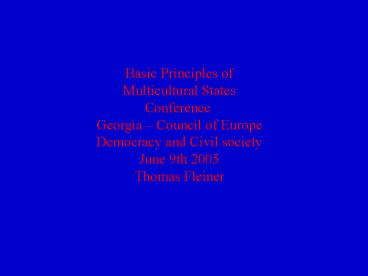Basic Principles of - PowerPoint PPT Presentation
1 / 13
Title:
Basic Principles of
Description:
Democracy and Civil society. June 9th 2005. Thomas Fleiner. Fourteen. Major Institutional ... Hobbes. Bearers of. unalienable. rights. Locke. Rational. Citoyens ... – PowerPoint PPT presentation
Number of Views:42
Avg rating:3.0/5.0
Title: Basic Principles of
1
Basic Principles of Multicultural
States Conference Georgia Council of
Europe Democracy and Civil society June 9th
2005 Thomas Fleiner
2
Fourteen Major Institutional Principles to
bring or hold A Multicultural Society together
3
The major Issue To hold or to bring
multicultural societies together
we have to ask
How should they be governed?
Who should govern whom?
And even more explosiv Who should decide, who
should govern?
4
The issues
Multicul- turality
Challenges of the Na- tion-State
The Actors
Nation- state
Diversi- tiy con- flicts
Glocali- sation
Fragmen- tation
5
Why is multiculturalism a problem?
Do federalism and decentralization help to bring
or to hold multicultural societies together?
6
Is a fragmented civil society as nation builder
of a multicultural state conceivable and
realistic?
Based on what concepts does the international
community intervene and/or manage conflicts of
multicutlural societies?
7
State of Modernity all individuals are equal as
being
Nation-State facing Multiculturality
Egocentric Hobbes
What
Universal values, but they do not take culture
as legtimacy fundament for politcal identity
serious
Bearers of unalienable rights Locke
Rational Citoyens Rousseau
Exploiters or exploited Marx
What is the main problem?
for all?
is
good
Capable of rea- son and judge- ment Kant
Cost-benefit driven Homo oeconomicus
8
Legitimacy
Rule of Law
Shared Rule
Self-Rule
Democracy
9
Legitimacy
1. Take cultural diversity seriously
2. Fatherland for minorities
3. Composed Nation
4. Multiple loaylty
10
Rule of Law
5. The Right to be unequal, or equal
rights versus the right to be equal
6. Four Dimension of Freedom From, By, Within,
To the State
7. Liberty and Peace
11
Shared Rule
8. Participation of ethnic Groups In Constitution
making
9. Power sharing of cultural communities
12
Self Rule
10. Autonomy
11. Enhancing diversity to overcome
ethnification of politics
13
Democracy
12. Self-determination of individuals as aim of
democracy
13. Value of compromise as alternative to
the winner takes all democracy
14. Conflict management































